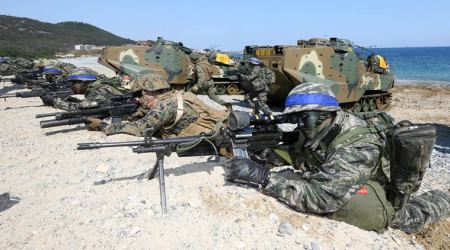 The implications of these facts go far beyond North Korea. (File)
The implications of these facts go far beyond North Korea. (File)
There ought to be no doubt about the enormity of what happened at high noon on Sunday, deep inside a tunnel in North Korea’s Punggye-ri test site: The world’s efforts to contain the spread of nuclear weapons, waged since the first atomic bomb was tested in 1945, have been buried once and for all. The precise yield character of what North Korea says was a 1-megaton fusion weapon may still be disputed, but there is no doubt about this: A nation that has faced international sanctions for over a decade, has succeeded in manufacturing a hydrogen bomb, and missiles to deliver it to the cities of adversaries across Asia and the Pacific. Pyongyang has done so despite a limited technological and industrial base.
The implications of these facts go far beyond North Korea. They tell us that, more than 70 years after the first nuclear tests at Alamogordo in the US, the science and technology behind mass death is inexorably becoming easier for determined states to master. They tell us that, short of war, there may be no means of stopping states from acquiring nuclear weapons. And they tell us that in many cases, like North Korea, preventive war may not be possible, because aspiring nuclear weapons states have superpower patrons — in this case, China — or conventional-weapons capabilities that can inflict damage too massive to countenance.
For the international community to find a way forward, three lessons must be learned. First, nuclear-proliferation is driven by the rational fears of regimes, not the madness of despots. By overthrowing regimes it charged with being enemies of human rights, the West gave powerful incentives to other states to pursue nuclear weapons. Libya’s Muammar Qaddafi and Iraq’s Saddam Hussein both gave up their weapons of mass destruction programmes; North Korea’s despots learned from their fate. The second lesson is this: Sanctions and threats cannot always stop more states from seeking nuclear weapons. Instead, there needs to be a genuine global compact that will guarantee state survival, as long as clearly-demarcated norms are met. Finally, the world must come to terms with the fact that mega-death cannot, and will not, remain the preserve of an élite club of nations. This may not, some contend, necessarily be a bad thing. Nuclear weapons stopped the Cold War from turning hot, the argument goes. Even North Korea, after all, understands that the price of using even one of its nuclear weapons is certain annihilation. Yet, as weapons proliferate, the risks also increase, whether by accident or design. The world must reflect — or face a long, nuclear night.

